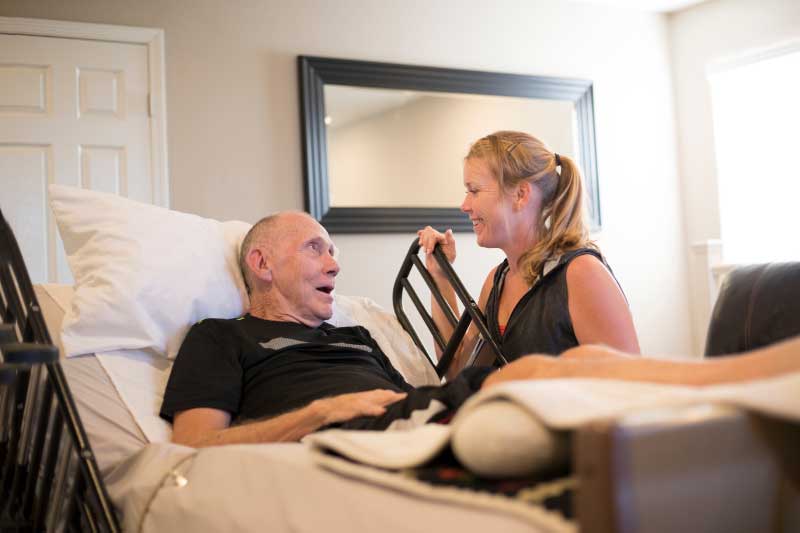Caring for a loved one facing a terminal illness can be overwhelming—both emotionally and physically. For families navigating this difficult phase, hospice care can offer much-needed relief and support. However, one of the most common questions families ask is, “How do I know if my loved one qualifies for hospice care?”
This blog will walk you through hospice eligibility guidelines, ensuring you understand the requirements and how hospice care can help you and your family during this challenging time.
What is Hospice Care?
Hospice care provides comfort-focused care for patients facing terminal illnesses, focusing on quality of life rather than curative treatments. It offers medical, emotional, and spiritual support tailored to the patient’s unique needs while providing resources to family members as caregivers.
Hospice care can occur in various settings—homes, hospice facilities, nursing homes, or even hospitals—ensuring care is provided where your loved one feels most comfortable.
Why Hospice Eligibility Guidelines Exist
Hospice care is a vital service designed to support individuals in the last stages of life. Medicare and other insurance agencies have set clear eligibility guidelines to ensure it benefits those who need it most. These guidelines are not meant to restrict care but to ensure timely access for patients who can benefit from it. Learn the hospice eligibility guidelines for patients with terminal illnesses like cancer, heart failure, COPD, and dementia.
Understanding these requirements is the first step in ensuring your loved one receives the care they deserve at the right time.
General Hospice Eligibility Requirements
While specific requirements vary slightly based on healthcare providers or insurance, most hospice organizations follow Medicare guidelines. These include the following key criteria:
1. A Life-Limiting Illness
To qualify for hospice care, the patient must have a terminal illness with a prognosis of six months or less if the disease progresses as expected. Common illnesses that may lead to hospice consideration include advanced cancer, heart failure, lung disease, kidney disease, and late-stage Alzheimer’s or dementia.
2. A Focus on Comfort, Not Cure
Hospice care is intended for patients who choose to forgo curative treatments. This shift in focus allows the hospice team to direct their efforts toward controlling symptoms and improving the individual’s quality of life.
3. A Physician’s Certification
To be eligible, two doctors (usually the patient’s physician and the hospice medical director) must certify that the patient’s illness is terminal and fits within the six-month prognosis guideline.
Hospice Eligibility by Disease
Each illness has its unique progression, and recognizing when hospice care is appropriate can vary. Below is an overview of eligibility indicators for common illnesses.
Cancer
- Advanced stage where curative treatment is no longer effective
- Rapid disease progression despite treatment
- Significant weight loss and declining physical function
Congestive Heart Failure (CHF)
- Frequent hospitalizations for symptoms like shortness of breath or chest pain
- Dependency on oxygen or declining ability to tolerate physical activity
- Reduced response to medication
Chronic Obstructive Pulmonary Disease (COPD)
- Frequent exacerbations despite optimal therapy
- Disabling shortness of breath even at rest
- Dependency on oxygen therapy
Dementia and Alzheimer’s Disease
- Difficulty with daily tasks such as dressing, eating, or moving around
- Frequent hospitalizations or infections such as pneumonia
- Limited verbal communication and inability to recognize loved ones
Kidney Disease
- Decision to stop dialysis treatments
- Significant weight loss and inability to maintain calorie or protein intake
- Decline in physical function and general health
When Should I Consider Hospice Care?
It can be challenging to know the right time to consider hospice for your loved one. Families often wait too long, fearing they’re “giving up” or unsure of the process. It’s important to remember that hospice care doesn’t mean giving up hope—it’s about offering comfort and dignity during life’s final stages.
Here are a few questions to ask yourself when considering hospice care:
- Is your loved one experiencing frequent hospitalizations or ER visits?
- Have they declined physically, losing weight, energy, or mobility?
- Are medications or treatments no longer improving their condition?
- Are they struggling with chronic pain or other uncomfortable symptoms?
Answering “yes” to these questions may suggest it’s time to explore hospice care options.
What Does Hospice Provide for Patients and Families?
Hospice care is comprehensive, addressing not only physical needs but also emotional and spiritual ones. Here’s how a hospice can help patients and their families.
Physical Support
Hospice care teams include doctors, nurses, and aides who manage pain and symptoms, from shortness of breath to nausea. They’re available 24/7 to address any unexpected issues.
Emotional and Spiritual Care
Counselors, chaplains, and social workers can provide emotional and spiritual guidance to the patient and their family, helping them find peace throughout the process.
Family Support
Caregiving can be exhausting, both mentally and physically. Hospice provides resources like respite care to give families a break while ensuring their loved one is well-cared for. After a loved one passes, bereavement services are available to support grieving family members.
Tangible Benefits
Hospice provides necessary medical equipment, medications, and supplies—such as hospital beds or oxygen tanks—to make home caregiving more manageable.
Next Steps to Take
Deciding on hospice care is never easy, but understanding eligibility requirements can help guide your decision. If you think a hospice may be the right choice for your loved one, follow these steps:
1. Speak with Their Physician
Start by discussing your loved one’s condition and prognosis with their doctor. They’ll help you understand whether hospice care is appropriate and guide you through the certification process.
2. Contact a Hospice Provider
Reach out to a local hospice organization for guidance. They will work with you to assess your loved one’s eligibility, provide support, and answer any questions you may have.
3. Discuss as a Family
Make sure all family members are informed and involved in the decision-making process. Honest conversations can help everyone feel prepared and aligned.
Hospice Care Brings Comfort and Dignity
Hospice care is about creating an environment of love, dignity, and respect during life’s most challenging moments. By understanding eligibility guidelines and knowing what to expect, you can ensure your loved one receives the compassionate care they need.
If you have questions or need help evaluating whether hospice is right for your family member, contact a trusted hospice organization today. Support and understanding are just a phone call away.










